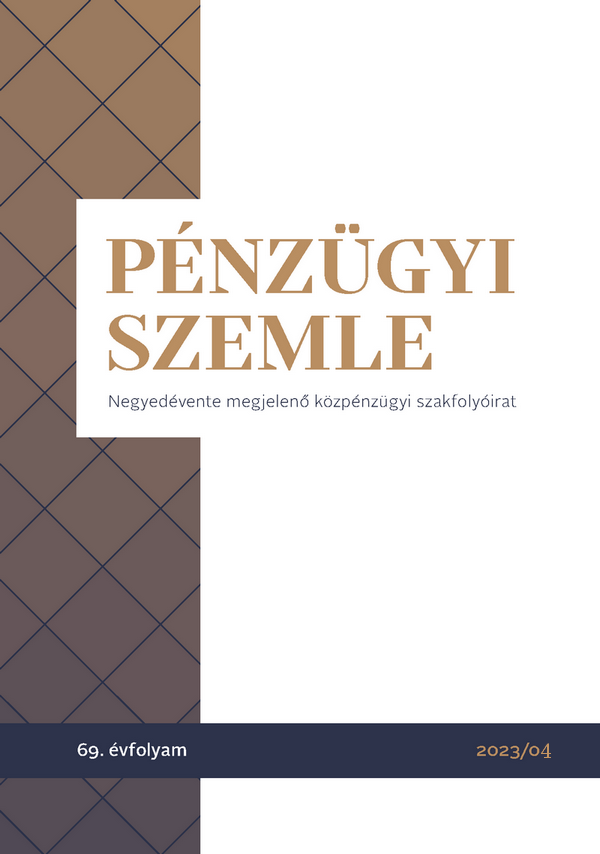The COVID-19 pandemic and discouraged borrowers among Hungarian companies
DOI:
https://doi.org/10.35551/PFQ_2023_4_3Keywords:
discouraged borrowers, latent demand for credit, COVID pandemic, corporate behaviour, C12, D22, D91, E71, G14, G33, G41, O16Abstract
An increasing attention has been paid since the millennium to companies who have loan demand but are afraid of refusal. The self-rationing of loan demand is also affected by the coronavirus pandemic according to the economic literature, however, there are only a few empirical studies regarding this topic. Based on the corporate surveys of the Hungarian Development Bank (MFB-INDIKÁTOR) we analyse that to what extent and to which direction did the latent loan demand of the Hungarian companies change as a consequence of the pandemic, which corporate segments reacted more sensitively to the crisis, and whether there is a measurable effect of the negative perception towards the banks to the lending decisions of the companies. On the basis of the results of cross-tabulation analyses the pandemic moderated the fear of loan application only temporarily; the behaviour of older firms, larger companies and the agricultural sector can be considered relatively stable regarding this issue; finally the role of the experiences and in many cases the negative preconceptions about the banks having a long history together play important roles in self-restraint.
References
Anastasiou, D., Kallandranis, C., Drakos, K. (2022). Borrower Discouragement Prevalence for Eurozone SMEs: Investigating the Impact of Economic Sentiment. Journal of Economic Behavior and Organization, 194, pp 161-171. https://doi.org/10.1016/j.jebo.2021.12.022
Aristei, A., Angori, G. (2022). Heterogeneity and State Dependence in Firms’ Access to Bank Credit. Small Business Economics, 59(1), pp 47-78. https://doi.org/10.1007/s11187-021-00545-x
Christensen, J. L., Hain, D. S. (2014). Scared Away? - Discouraged Borrowers and Capital Market Information. DRUID Society Conference 2014, CBS, Copenha-gen, June 16-18. https://conference.druid.dk/acc_papers/ugm9tep44k4dj-ni4u7xo1sksx3tn.pdf
Cowling, M., Liu, W., Ledger, A. (2012). Small Business Financing in the UK before and during the Current Financial Crisis. International Small Business Journal, 30(7), pp 778-800. https://doi.org/10.1177/0266242611435516
Cowling, M., Liu, W., Calabrese, R. (2021). Has Previous Loan Rejection Scarred Firms from Applying for Loans During Covid-19? Small Business Economics, 59, pp 1327-1350. https://doi.org/10.1007/s11187-021-00586-2
Durante, E., McGeever, N. (2022). SME Credit Conditions in the Pandemic Re-covery. Central Bank of Ireland, Financial Stability Notes, 22(2). https://www.centralbank.ie/docs/default-source/publications/financial-stability-no-tes/no.2-sme-credit-conditions.pdf?sfvrsn=16
ECB (2022a). SAFE 10 Datasets for External Researchers. https://astra.ecb.europa.eu/
ECB (2022b). SAFE Database. https://single-market-economy.ec.europa.eu/access-finance/data-and-surveys-safe_en
Ferrando, A., Mulier, K. (2015). The Real Effects of Credit Constraints: Evidence from Discouraged Borrowers in the Euro Area. ECB Working Paper, 1842. https://www.ecb.europa.eu/pub/pdf/scpwps/ecbwp1842.en.pdf?619f3288440cf4d-1d463ebed036ddca7
Ferrando, A., Mulier, K. (2022). The Real Effects of Credit Constraints: Evidence from Discouraged Borrowers. Journal of Corporate Finance, 73(C). https://doi.org/10.1016/j.jcorpfin.2022.102171
Hernández-Cánovas, G., Ramón-Llorens, M. C., Koeter-Kant, J. (2014). A Dem-and Approach to Borrower Discouragement: Empirical Analysis in a Bank-Based Economy. XXII Finance Forum, Zaragoza, november 20–21. http://22finance-forum.unizar.es/wp-content/uploads/2014/11/22financeforum_submissi-on_64_A-demand-approach.pdf
Kinghan, C., Newman, C., O’Toole, C. (2018). Capital Allocation, Credit Access, and Firm Growth in Vietnam. WIDER Working Paper 67. https://www.esri.ie/pubs/OPEA166.pdf
Kozlowski, J. (2020). Scarring Body and Mind: The Long-Term Belief-Scarring Effects of COVID-19. FRB St. Louis Working Paper 2020-9. https://doi.org/10.20955/wp.2020.009
Menéndez, Á., Mulino, M. (2022). Recent Economic Performance of Spanish SMEs and Developments in their Access to External Financing according to the European Central Bank’s Half-yearly Survey. Banco de Espana, Economic Bulletin 3/2022. https://repositorio.bde.es/bitstream/123456789/22637/1/be2203-art14e.pdf
MFB-INDIKÁTOR database of corporate surveys16. Rostamkalei, A. (2017). Discouraged Borrowers aftermath of Financial Crisis: A UK Study. Journal of Small Business and Enterprise Development, 24(2), pp 394-410. https://doi.org/10.1108/jsbed-09-2016-0137
Siedschlag, I., O’Toole, C., Murphy, G., O’Connell, D. (2014). Access to External Financing and Firm Growth. Background Study for the European Competitiveness Report 2014, ESRI, https://ec.europa.eu/docsroom/documents/8786/attachments/1/translations/en/renditions/pdf
Szabó, Zs. (2019). Elbátortalanodott hiteligénylők a vállalati szektorban. Közgazdasági Szemle, 66(11), pp 1145-1186. https://doi.org/10.18414/KSZ.2019.11.1145
Taleb, N. N. (2007). The Black Swan: The Impact of the Highly Improbable. Random House, New York
Downloads
Published
How to Cite
Issue
Section
License
Authors assign copyright to Pénzügyi Szemle / Public Finance Quarterly. Authors are responsible for permission to reproduce copyright material from other sources.












